Understanding the Transformative Power of Self-Discovery Through Counseling
Self-discovery is a profound and ongoing process that empowers individuals to connect with their true selves, align with personal values, and foster meaningful growth. This journey, while intensely personal, is greatly supported by counseling and therapy, which provide safe spaces and professional guidance essential for navigating inward exploration. In this article, we explore the concept of self-discovery, the vital role of counseling in this journey, practical methods to engage in self-exploration, and the stages and benefits that accompany such a transformative process.
The Essence and Importance of Self-Discovery for Mental Health and Personal Growth
What is the concept of self-discovery and why is it important for mental health and personal development?
Self-discovery is a continuous journey of understanding your real self — your core values, passions, needs, and beliefs. It involves introspection, reflection, and mindfulness practices that help you uncover who you truly are beneath societal expectations and external pressures.
Engaging in self-awareness through activities like journaling , meditation , and reflective questioning allows individuals to connect with their inner motivations and authentic identity.
This process is crucial for mental health because it reduces feelings of confusion, anxiety, and depression by fostering a stronger sense of self and emotional resilience. When people understand their authentic selves, they experience less internal conflict, leading to improved emotional regulation and well-being.
Furthermore, self-discovery enhances personal development by providing clarity on life purpose and guiding decisions that align with one's true self. It boosts confidence, encourages genuine relationships, and helps individuals live more fulfilling lives.
In essence, self-discovery is vital because it nurtures mental health, promotes self-acceptance, and drives personal growth, making life more meaningful and aligned with personal passions and values.
Counseling as a Catalyst for Self-Discovery and Personal Insight
Therapy provides a nurturing environment where individuals feel safe and supported to explore their inner worlds. This non-judgmental space fosters honest self-reflection, allowing clients to examine their thoughts, feelings, and experiences without fear or shame. Such openness is crucial for uncovering hidden beliefs, unconscious patterns, and relational dynamics that shape one’s identity.
In the role of guiding self-exploration, therapists employ various techniques such as mindfulness, guided questioning, journaling, and art therapy. These methods aid clients in gaining new perspectives about themselves, increasing self-awareness, and understanding the origins of their behaviors and emotions. As individuals connect more with their true selves, they often experience emotional healing, particularly when addressing past traumas or unresolved conflicts.
Counseling also plays a vital role in developing coping skills and resilience. Through therapeutic work, clients learn practical strategies to manage stress, navigate life transitions, and build healthier relationships. As these skills strengthen, individuals often find their self-esteem and confidence grow, enabling them to live more authentically.
Ultimately, therapy encourages ongoing self-discovery by fostering deep introspection, emotional healing, and healthier relational patterns. This process empowers individuals to make conscious life choices aligned with their core values, leading to a more fulfilled and authentic existence. The journey through counseling thus acts as a catalyst, unlocking personal insight and paving the way for ongoing growth.
Practical Methods and Exercises to Foster Self-Discovery
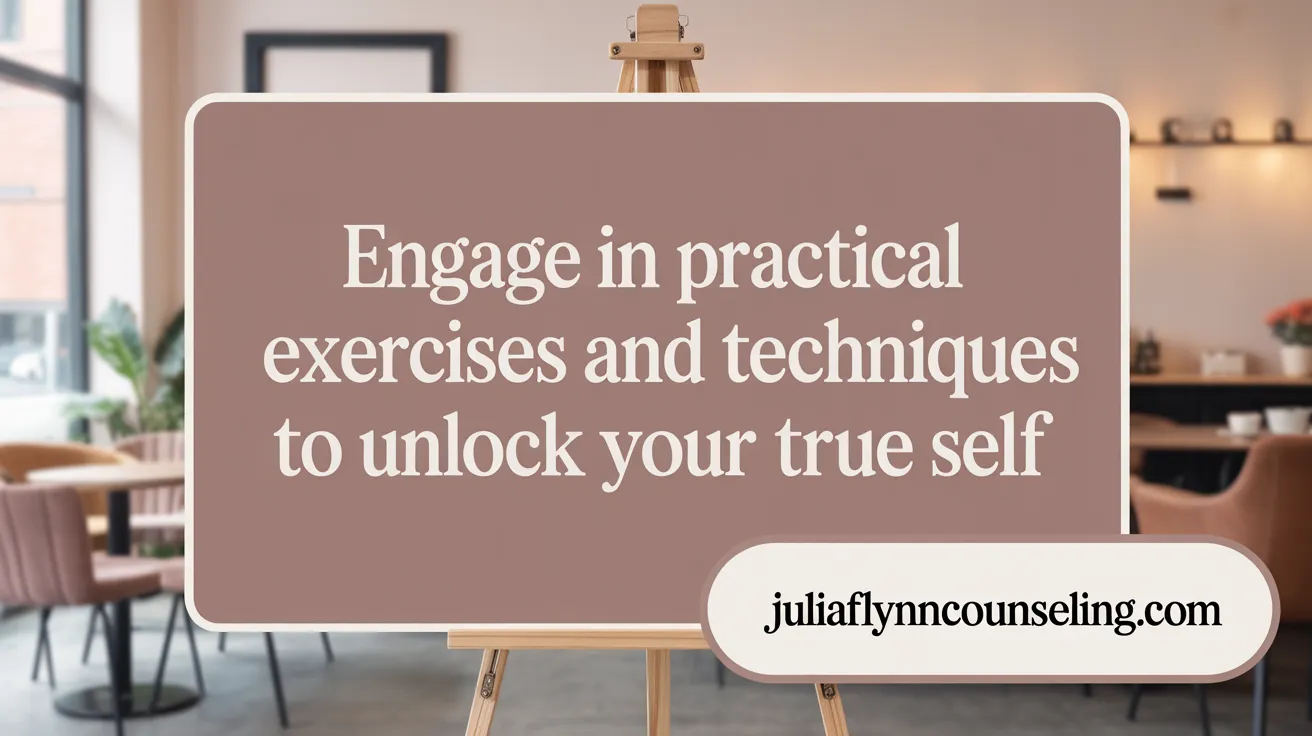 Engaging actively in self-discovery requires utilizing a variety of practical methods and exercises that promote awareness and insight. Mindfulness and meditation are foundational techniques that enhance present-moment awareness, helping individuals become more attuned to their emotions and inner states. Tools like mindfulness apps such as Waking Up or Reflectly support regular practice, making it easier to incorporate into daily life.
Engaging actively in self-discovery requires utilizing a variety of practical methods and exercises that promote awareness and insight. Mindfulness and meditation are foundational techniques that enhance present-moment awareness, helping individuals become more attuned to their emotions and inner states. Tools like mindfulness apps such as Waking Up or Reflectly support regular practice, making it easier to incorporate into daily life.
Journaling prompts and reflection exercises serve as powerful ways to explore thoughts, feelings, and recurring patterns. For example, prompts that ask, "What are my core values?" or "What makes me feel most alive?" encourage deep self-inquiry. Using worksheets and structured questions about fears, ambitions, and meaningful experiences can uncover hidden aspects of one’s identity.
Personality assessments like the Myers-Briggs Type Indicator, Enneagram, or DISC provide valuable insights into personal traits, strengths, and tendencies. Visualization exercises, such as creating vision boards or imagining ideal days, clarify future goals and desires. These exercises help articulate what truly aligns with your authentic self.
Creative activities such as art, writing, or music allow emotional expression and can reveal subconscious thoughts and beliefs. Exploring personal values through storytelling or creating personal mission statements initiates meaningful self-targeted reflection.
To deepen connection between mind and body, grounding techniques like the Grounding Chair technique or practices like yoga, Qigong, or Tai Chi foster bodily awareness. Asking introspective questions—probing beliefs, motivations, and relationships—along with tools like SWOT analysis or the Wheel of Life, can provide a broader perspective on life balance and personal priorities.
Utilizing technology to support self-awareness, including apps for meditation, journaling, or life assessment, makes these practices accessible and manageable. When combined, these methods foster emotional resilience, clarity, and authentic self-understanding, guiding personal growth and alignment.
Navigating the Stages and Strategies of the Self-Discovery Journey
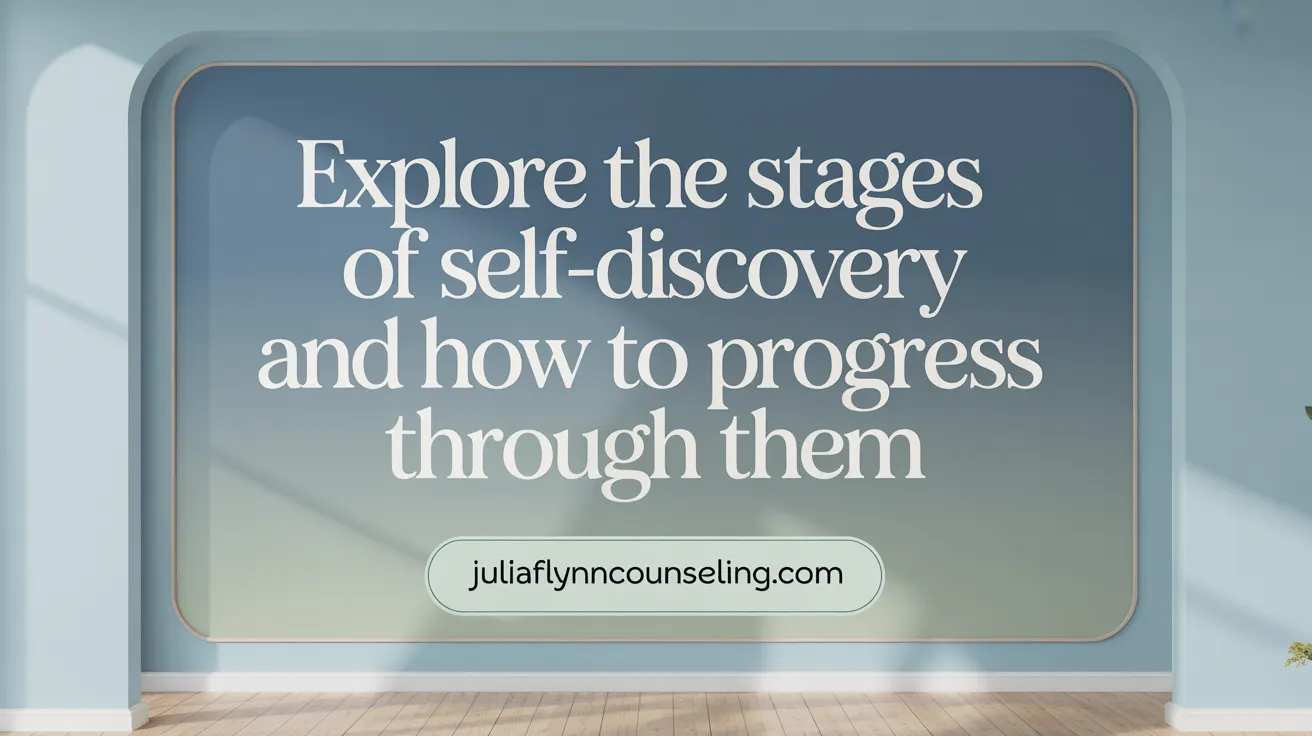 Understanding oneself is a complex, layered process that unfolds through distinct but interconnected stages, each contributing to personal growth and a deeper sense of authenticity.
Understanding oneself is a complex, layered process that unfolds through distinct but interconnected stages, each contributing to personal growth and a deeper sense of authenticity.
The framework for self-discovery often includes four core stages:
| Stage | Description | Supporting Activities |
|---|---|---|
| Alignment to Self | Recognizing and transforming one’s core identity, beliefs, and perceptions to live authentically | Reflection, journaling, meditating, inner work, and values clarification |
| Connectedness to a Greater Whole | Exploring one’s connection with the universe, community, or spiritual aspects | Mindfulness, nature walks, spiritual practices |
| Discovering Soul Purpose | Identifying and expressing what uniquely fulfills and energizes an individual | Visualization, exploring passions, setting personal goals |
| Broad Life Perspective | Gaining understanding of how life’s experiences interconnect and support overall growth | Broader philosophical reflection, engaging in new experiences |
This journey is not linear but cyclical, requiring ongoing reflection and adjustment. As individuals progress, they often encounter internal obstacles such as fear, self-doubt, or societal pressures. Overcoming these barriers involves embracing vulnerability, practicing self-compassion, and maintaining patience (5 Self-Discovery Tips Therapists Swear By).
Time and patience play a pivotal role, as genuine self-knowledge develops gradually. Trial and error, experimenting with new activities, and revisiting past experiences facilitate the discovery process. Techniques like honest self-reflection, feedback from trusted sources, and mindfulness practices help deepen understanding and reinforce authentic identity (How to Begin Your Self-Discovery Journey).
By consistently engaging with these stages and strategies, individuals can align more closely with their true selves, leading to a life of purpose, fulfillment, and inner harmony (The 4 Stages of Self-Discovery). This ongoing process not only facilitates personal growth but also fosters resilience, confidence, and a profound sense of inner peace (Transformative Self-Awareness Techniques).
The Integral Role of Self-Awareness in Therapy and Personal Development
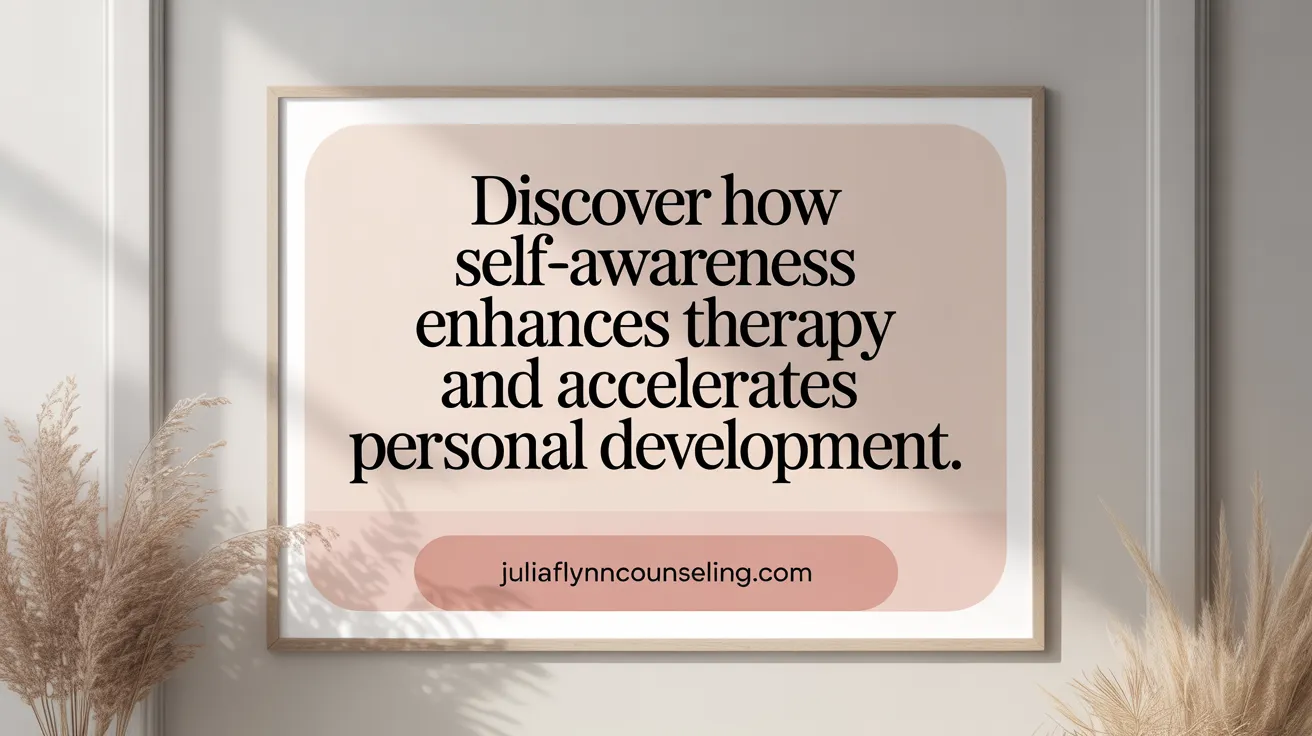 Self-awareness is a fundamental component in both therapeutic settings and personal growth journeys. For therapists, it involves a continuous process of understanding their own thoughts, feelings, biases, and values, which directly influences the quality of care they provide. This deep self-knowledge enables therapists to manage their emotional reactions, such as countertransference, and to recognize unconscious prejudices that could affect their clinical judgment.
Self-awareness is a fundamental component in both therapeutic settings and personal growth journeys. For therapists, it involves a continuous process of understanding their own thoughts, feelings, biases, and values, which directly influences the quality of care they provide. This deep self-knowledge enables therapists to manage their emotional reactions, such as countertransference, and to recognize unconscious prejudices that could affect their clinical judgment.
Practices like recording therapy sessions, engaging in supervision, and reflective journaling are powerful tools therapists use to enhance self-awareness. These activities help uncover implicit biases and emotional triggers, ensuring ethical and effective treatment. When therapists are aware of their internal states, they can better attune to their clients, foster trust, and create a safe, supportive environment that encourages genuine self-exploration (Self-awareness in counseling, Therapist self-awareness).
In the realm of personal development, self-awareness allows individuals to recognize their habitual thought patterns, emotional responses, and underlying motivations. This clarity promotes insight into personal strengths and areas for growth, aiding in emotional regulation and decision-making (Role of Therapy in Personal Growth, Self-Discovery Journey). Increased self-awareness also supports resilience by helping individuals understand and navigate their reactions to life's challenges (Power of Therapy).
Overall, cultivating self-awareness forms the bedrock of effective therapy and meaningful personal change. It encourages a mindful approach to both clinical practice and everyday life, reinforcing the importance of ongoing self-reflection. As both therapists and clients deepen their self-understanding, they foster authentic interactions, ethical integrity, and lasting resilience, all of which are essential for growth and well-being (Counselor self-awareness benefits, Self-awareness in counseling).
Initiating and Sustaining Your Self-Discovery Journey with Counseling Support
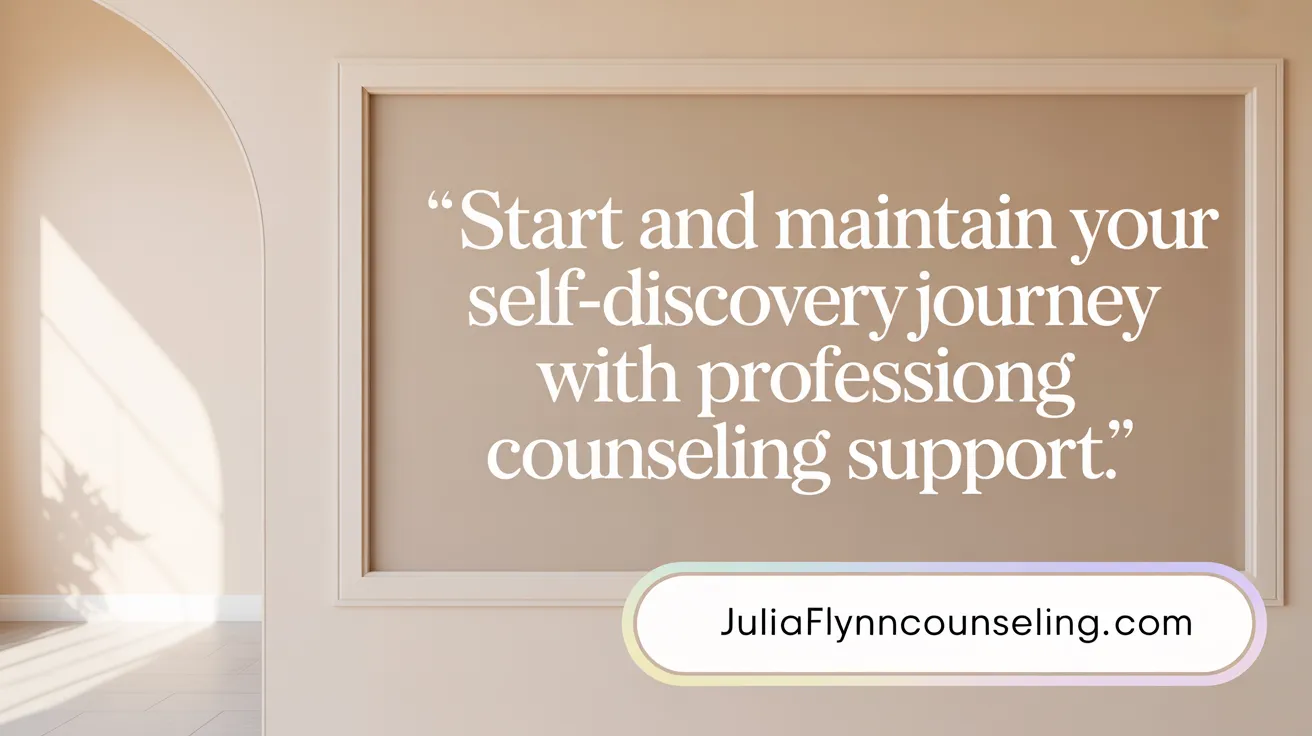 Starting a self-discovery journey involves intentional steps and the support of therapeutic guidance to explore your inner world effectively.
Starting a self-discovery journey involves intentional steps and the support of therapeutic guidance to explore your inner world effectively.
The first step is to set clear intentions. Carving out dedicated, uninterrupted time—such as a discovery session—is essential. During this time, reflect on your life's purpose, passions, and core values. Journaling prompts and guided questions can help you explore what truly energizes and fulfills you, such as imagining your ideal day or projecting future scenarios that align with your aspirations.
Using therapeutic guidance can help you delve into unconscious patterns, childhood influences, and hidden beliefs that shape your current behaviors. Therapists and coaches leverage techniques like mindfulness, guided questioning, and art therapy to facilitate deeper insights. These methods assist you in recognizing your shadow aspects, understanding your emotional reactions, and uncovering motivations that you may not be fully aware of.
It is vital to practice patience and stay committed to the process. Self-discovery is a continuous, evolving journey that goes through various stages—from self-awareness and understanding your personality to aligning your actions with authentic passions and, ultimately, experiencing self-transcendence. Progress may be gradual, but maintaining consistent effort through regular reflection, mindfulness, and openness fosters personal growth.
Seeking professional support can significantly enhance your self-discovery process. Therapists and counselors provide accountability, validation, and expert guidance, helping you navigate challenges such as anxiety, trauma, or limiting beliefs. They also assist in developing supportive habits and integrating insights into daily life.
In summary, effective self-discovery starts with intentional planning, open exploration, and ongoing commitment. With patience and professional support, you can uncover your true self, align your life with your core values, and cultivate a more fulfilled, authentic existence.
Counseling Resources and Insights to Enhance Self-Awareness and Foster Growth
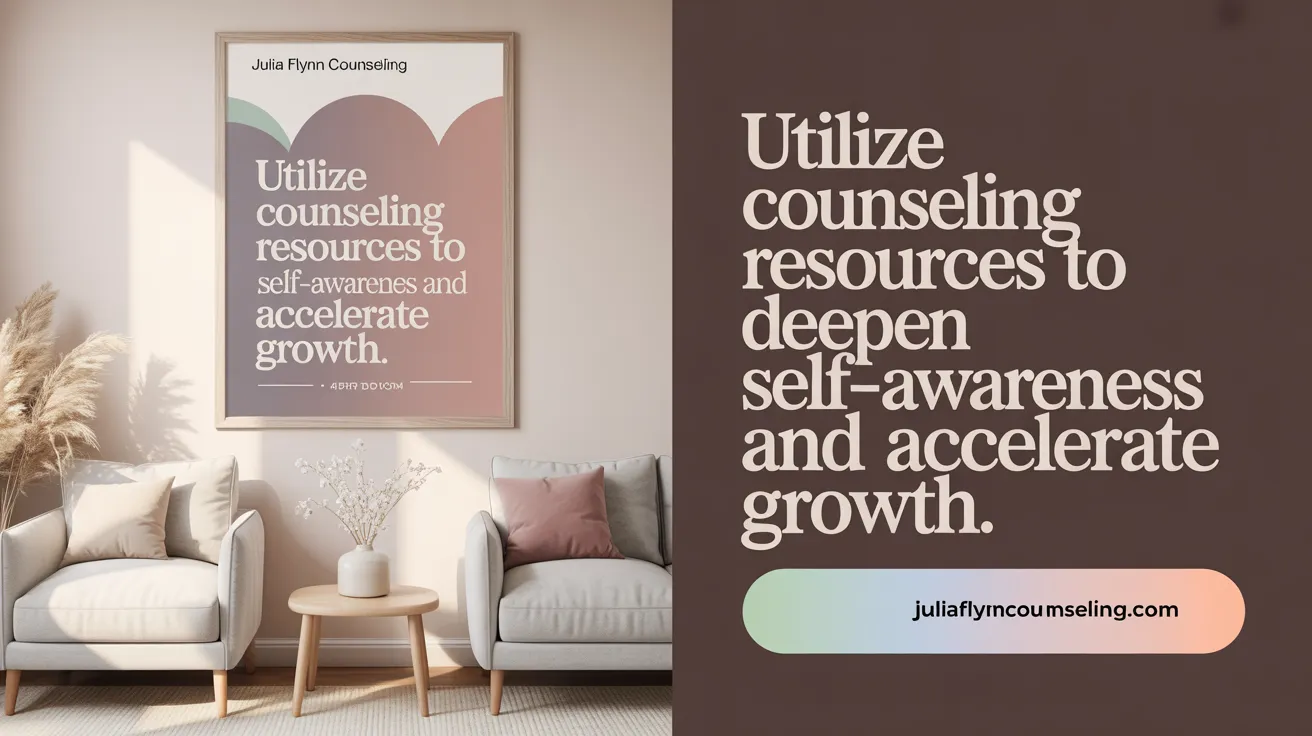
Educational materials and reflective exercises
Counseling provides a variety of educational resources and reflective exercises designed to deepen self-awareness. These include prompts for journaling, mindfulness practices, and guided questions that encourage individuals to explore their inner thoughts, beliefs, and emotional responses. For example, worksheets focusing on personal values, talents, and core identity can help clients uncover what truly matters to them. Engaging regularly in these activities promotes ongoing self-reflection, helping individuals recognize patterns and gain clearer insight into their motivations and behaviors.
Use of mindfulness, journaling, and feedback
In therapy, mindfulness techniques—such as body scans and present-moment awareness—are used to help clients tune into their emotions and physical sensations. Journaling acts as a powerful tool for processing experiences, exploring feelings, and tracking personal growth over time. Additionally, seeking constructive feedback from therapists or trusted individuals can reveal unconscious biases and reinforce self-awareness. These practices not only develop emotional regulation but also foster authenticity and confidence, supporting sustained self-growth.
Counselor self-awareness enhancing therapy effectiveness
A vital aspect of effective counseling is the counselor’s own self-awareness. Therapists continually engage in self-reflection through supervision, personal therapy, and mindfulness to understand their biases, triggers, and emotional reactions. This ongoing self-awareness enhances their clinical effectiveness by allowing them to respond more authentically and ethically to clients. When counselors are attuned to their internal states, they can better facilitate clients’ journeys toward greater self-understanding, creating a supportive and empowering therapeutic relationship.
Tools that support decision-making, emotional regulation, and relationships
Numerous tools are available within therapy to bolster decision-making, emotional regulation, and relationship skills. Structured exercises, such as values clarification or SMART goal setting, aid clients in making aligned choices and establishing achievable objectives. Techniques like emotion regulation strategies and conflict resolution skills improve interpersonal interactions. Moreover, apps supporting meditation and reflection, such as Waking Up or Reflectly, complement therapy by offering accessible means for ongoing self-awareness. Combined, these resources empower individuals to navigate life’s challenges with resilience, clarity, and purpose.
| Resource Type | Purpose | Benefit |
|---|---|---|
| Journaling worksheets | Self-reflection | Recognize emotions, track growth |
| Mindfulness apps | Present-moment awareness | Reduce stress, increase clarity |
| Feedback sessions | External insights | Uncover unconscious patterns |
| Values clarification tools | Decision-making | Align actions with core values |
| Emotional regulation techniques | Manage emotions | Improve relationships and mental health |
| Structured goal-setting | Personal development | Achieve meaningful milestones |
By integrating these educational, reflective, and practical resources, counseling continually supports the journey of self-discovery and personal transformation, leading to a healthier, more authentic self.
Embracing the Journey: Counseling as a Gateway to Authentic Living
Embarking on the path of self-discovery is a courageous and transformative endeavor that nurtures mental health, emotional resilience, and enriched relationships. Counseling serves as an invaluable companion on this journey by providing a supportive, insightful space to explore the depths of one’s inner world. Through diverse techniques, therapeutic presence, and professional guidance, counseling enhances self-awareness, facilitates healing, and empowers authentic living aligned with one’s true values and purpose. While self-discovery is ongoing and uniquely personal, the integration of counseling and reflective practices offers a structured yet compassionate approach to unlocking one’s fullest potential, leading to a more meaningful and fulfilling life.
